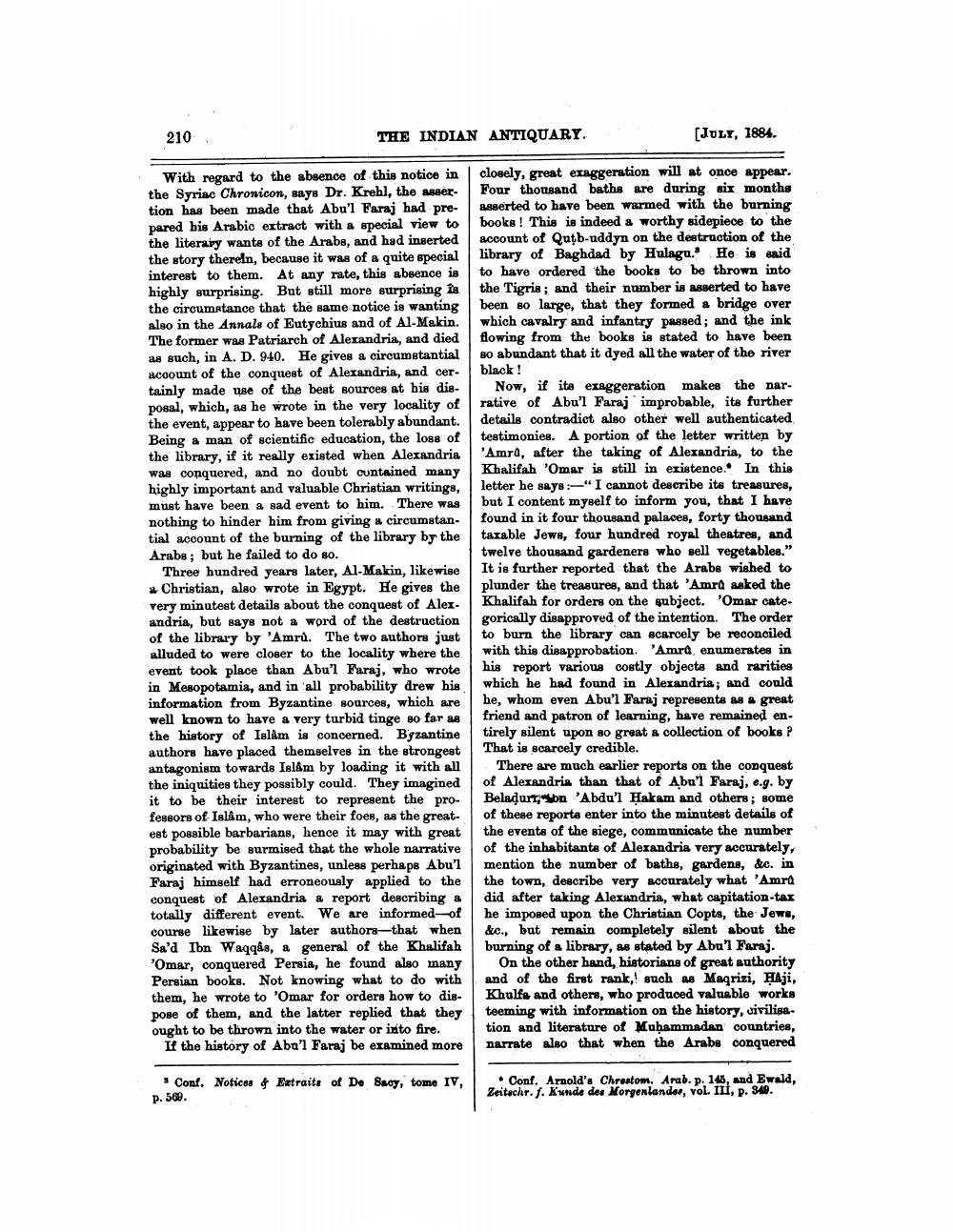________________
210
THE INDIAN ANTIQUARY.
[JULY, 1884.
With regard to the absence of this notice in the Syriac Chronicon, says Dr. Krebl, the asser. tion has been made that Abu'l Faraj had prepared his Arabic extract with a special view to the literary wants of the Arabs, and had inserted the story therein, because it was of a quite special interest to them. At any rate, this absence is highly surprising. But still more surprising is the circumstance that the same notice is wanting also in the Annals of Eutychius and of Al-Makin. The former was Patriarch of Alexandria, and died as such, in A. D. 940. He gives a circumstantial acoount of the conquest of Alexandria, and cer. tainly made use of the best sources at his disposal, which, as he wrote in the very locality of the event, appear to have been tolerably abundant. Being a man of scientific education, the loss of the library, if it really existed when Alexandria was conquered, and no doubt contained many highly important and valuable Christian writings, must have been a sad event to him. There was nothing to hinder him from giving a circumstantial account of the burning of the library by the Arabs; but he failed to do so.
Three hundred years later, Al-Makin, likewise * Christian, also wrote in Egypt. He gives the very minutest details about the conquest of Alex. andria, but says not a word of the destruction of the library by 'Amru. The two authors just alluded to were closer to the locality where the event took place than Abu'l Faraj, who wrote in Mesopotamia, and in all probability drew his information from Byzantine sources, which are well known to have a very turbid tinge so far as the history of Islam is concerned. Byzantine authors have placed themselves in the strongest antagonism towards Islâm by loading it with all the iniquities they possibly could. They imagined it to be their interest to represent the professors of Islam, who were their foes, as the greatest possible barbarians, hence it may with great probability be surmised that the whole narrative originated with Byzantines, unless perhaps Abu'l Faraj himself had erroneously applied to the conquest of Alexandria a report describing a totally different event. We are informed-of course likewise by later authors-that when Sa'd Ibn Waqqas, a general of the Khalifah 'Omar, conquered Persia, he found also many Persian books. Not knowing what to do with them, he wrote to 'Omar for orders how to dispose of them, and the latter replied that they ought to be thrown into the water or into fire.
If the history of Aba'l Faraj be examined more
closely, great exaggeration will at once appear. Four thousand baths are during six months asserted to have been warmed with the burning books! This is indeed a worthy sidepiece to the account of Qutb-uddyn on the destruction of the library of Baghdad by Hulagu. He is said to have ordered the books to be thrown into the Tigris; and their number is asserted to have been so large, that they formed a bridge over which cavalry and infantry passed; and the ink flowing from the books is stated to have been 80 abundant that it dyed all the water of the river black!
Now, if its exaggeration makes the nar. rative of Abu'l Faraj improbable, its further details contradict also other well authenticated testimonies. A portion of the letter written by 'Amro, after the taking of Alexandria, to the Khalifah 'Omar is still in existence. In this letter he says :-"I cannot describe its treasures. but I content myself to inform you, that I have found in it four thousand palaces, forty thousand taxable Jews, four hundred royal theatres, and twelve thousand gardeners who sell vegetables." It is further reported that the Arabs wished to plunder the treasures, and that 'Amrd asked the Khalifah for orders on the subject. 'Omar categorically disapproved of the intention. The order to burn the library can scarcely be reconciled with this disapprobation. 'Amrd, enumerates in his report various costly objects and rarities which he had found in Alexandria; and could he, whom even Abu'l Faraj represents as a great friend and patron of learning, have remained entirely silent upon ao great a collection of books P That is scarcely credible.
There are much earlier reports on the conquest of Alexandria than that of Abu'l Faraj, e.g. by Beladurt;bn 'Abdu'l Hakam and others; some of these reports enter into the minutost details of the events of the siege, communicate the number of the inhabitants of Alexandria very accurately, mention the number of baths, gardens, &c. in the town, describe very accurately what 'Amra did after taking Alexandria, what capitation-tax he imposed upon the Christian Copts, the Jews, &c., but remain completely silent about the burning of a library, as stated by Abu'l Faraj.
On the other hand, historians of great authority and of the first rank, such as Maqrizi, Aji, Khulfo and others, who produced valuable works teeming with information on the history, civilisation and literature of Muhammadan countries, narrate also that when the Arabs conquered
Conf. Noticon f Extraits of De Sacy, tome IV, p. 589.
. Conf. Arnold's Chrestom. Arab. p. 145, and Ewald, Zeitschr. f. Kwade des Morgenlande, vol. III, p. 349.




